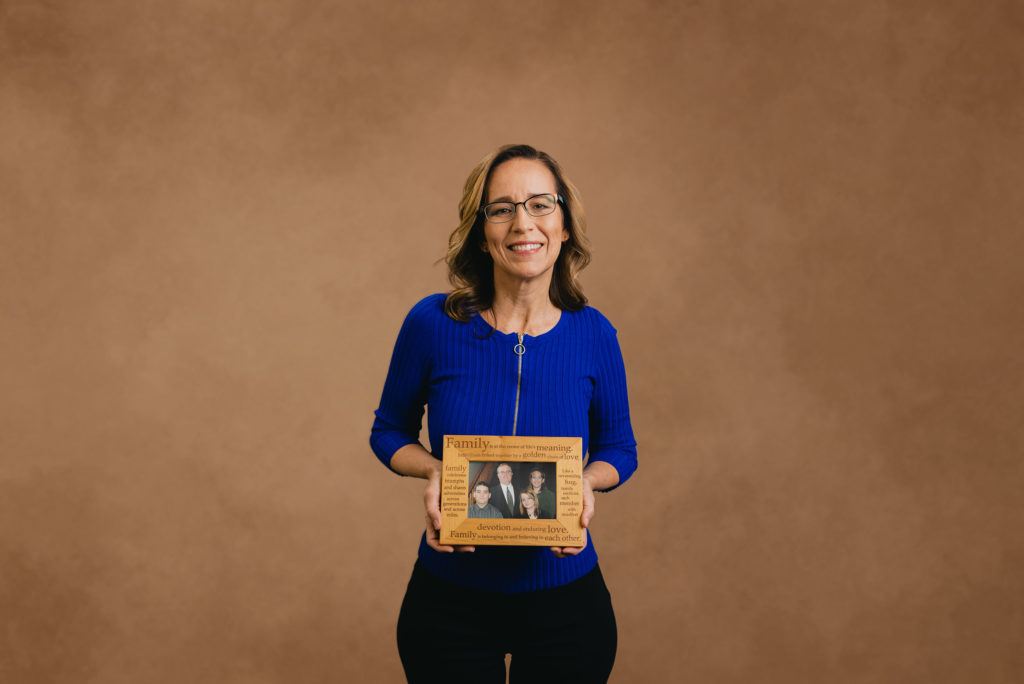
Ivy Blog
Brain Cancer Survivor Is On A Mission To Support Others Living With The Disease
- June 22, 2022
- Ivy Center
- Posted in Patient Stories

A brain cancer diagnosis changes everything. Even with a skilled medical team by their side, many patients feel an overwhelming sense of fear and isolation when faced with the uncertainty of their future. Lanette Veres, who was first diagnosed with brain cancer 24 years ago, knows those feelings all too well. As the founder of the Gray Matters Foundation and the official support partner of the Ivy Brain Tumor Center at Barrow Neurological Institute, Lanette has made it her mission to support others facing the disease.
Brain Cancer Is A Devastating Diagnosis
In 1998, Lanette was at the height of her career as a bank relationship manager and juggling the responsibilities of being a single mother to two young children. She was always busy and always on the go. When Lanette started experiencing headaches, she didn’t overthink it and tried to push through. But the headaches kept getting worse. For a year, Lanette tried in vain to get her insurance company to authorize an MRI. Then, the unexpected happened. Lanette was out with a friend when suddenly, she experienced a focal seizure. It was a struggle, but Lanette’s insurance company finally relented and granted her the MRI. The results of that MRI would change her life forever. “It’s been 24 years, but I can still remember that moment like it was yesterday. I was sitting at my desk at work, and the doctor called and told me that I had a baseball-size mass in my brain and needed surgery immediately to remove it,” Lanette recalls.
The diagnosis stole the breath right out of Lanette’s lungs. She had only known one other person with brain cancer, her beloved grandmother, who had succumbed to the disease in only nine weeks, leaving her heartbroken. “My first thought was I couldn’t die. My grandmother had died from a brain tumor. That was my whole experience with them—you got a brain tumor and you died. I couldn’t do that. I had two kids to raise, and I wanted to live,” she says.
Beginning The Long Journey To Surviving Brain Cancer

On September 2, 1998, Lanette underwent a 13-hour surgery at Barrow Neurological Institute to remove the tumor on the right side of her temporal lobe. The surgery was a success. Unbeknownst to Lanette, however, her journey was just beginning. “I figured they were going to take the tumor out and I’d just go back to work and life like normal. But that’s not what happened,” she says. Instead, a pathology revealed that Lanette’s tumor was cancerous. As soon as she heard the prognosis, her stomach sank. Life as she knew it would never be the same again. “I didn’t think I wasn’t going to be able to go back to work, but after surgery to remove a second tumor, I had to medically retire because it affected my ability to do math,” Lanette says. Suddenly, she found herself standing on the precipice of a whole new future as a brain cancer survivor, and she felt utterly lost and alone. She explains, “I left not knowing if there was any support offered. I didn’t know who to talk to or turn to, so I decided to do something myself.”
Over time, Lanette began to adjust to her new life. She married the love of her life, Mike, attended brain tumor survivorship conferences and started sending cheerful cards and packages to patients she met at different support events.
The Path To Becoming A Brain Cancer Survivor Isn’t A Straight Line
In 2003, Lanette officially hit the five-year mark from her initial diagnosis. She was elated. “I remember the doctor telling me that for brain tumor patients, if you make it to five years, you’re doing great; if you make it to ten years, you have it made. I was just like oh my goodness, I made it. I survived,” she says. However, the celebration was short-lived. At Lanette’s next scan, she received devastating news. The MRI revealed that she had another brain tumor, but this time it was near her brain stem, making it inoperable. Lanette’s only option was chemo and radiation. It was completely disheartening—she was exhausted with this battle and the thought of yet another treatment was incredibly daunting. “The thing about being a long-term survivor is the more you know, the scarier it is. I mean, how many times can you have someone going into your brain and still come out walking and talking. Your brain is who you are and I was very concerned about my mind,” she says.
I figured if I’m going to live, I might as well live with intention.
Lanette Veres, Brain Cancer Survivor
Once again, Lanette made it through treatment with resounding strength and positivity. Her condition has been stable ever since. “Every year, I celebrate my tumorversary, like celebrating a birthday,” she says. “I figured if I’m going to live, I might as well live with intention.”
Supporting Other Brain Cancer Patients
Despite undergoing five brain surgeries, Lanette hasn’t slowed down. In 2007, she officially formed the Gray Matters Foundation to support and empower those impacted by brain tumors through outreach, awareness, and assistance. To date, Lanette has sent support packages to brain tumor patients in all 50 states and 23 countries. Looking back at how far the Gray Matters Foundation has come, she says, “It’s crazy. I never dreamed it would become what it is. I was just helping with a support group; that was my gift back. Now, I’m helping people all over the world. It’s a great thing to pour my heart into.”
Lanette has kept Barrow close to her heart throughout the years. She helps facilitate the Barrow Brain Tumor Support Group, which meets in person on the fourth Tuesday of each month, from 6:00 to 7:30 p.m. in the Sonntag Pavilion at Barrow Neurological Institute. In addition, the Gray Matters Foundation is now the official support partner of the Ivy Brain Tumor Center. “Collaborating with the Ivy Center and offering the support group virtually, we get people from all over participating and we’re able to talk to them about a place that offers so much more for patients,” she says. “I always say, if I can recommend one thing, it’s to reach out to the people at the Ivy Center because they can help. They can offer hope.”
Help the Ivy Brain Tumor Center achieve its mission of contributing to a cure for brain cancer in the next decade by making a gift today.

This story is for general health information only and is not meant to be used as medical advice, diagnosis or treatment. Please consult your physician or healthcare provider before beginning any treatment protocol or with any questions. This story reflects the health status of this particular patient at the time the story was written and photographs were taken. The patient’s condition may have changed over time.
